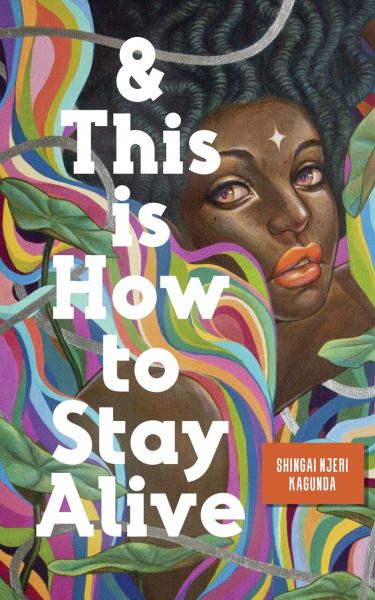Have You Ever Seen the Rain?
& This Is How to Stay Alive
By Shingai Njeri Kagunda

12 Nov, 2021
0 comments
Shingai Njeri Kagunda’s & This Is How to Stay Alive is a standalone fantasy novel.
When Nyokabi’s brother Baraka commits suicide, Nyokabi sees only way to go forward: become the responsible surviving sibling. She will make sure that her brother’s funeral is done properly, as her grief-stricken mother cannot manage.
It is not the only option open to her.
An unfamiliar old auntie chides Nyokabi for her grief, insisting that “not here” does not mean “not anywhere.” In lieu of a detailed explanation, the old woman gives Nyokabi a bottle containing a mysterious liquid. A single spoonful of the contents has a remarkable effect.
Nyokabi finds herself in the past, when Baraka was still alive. Baraka killed himself rather than face pressure and bullying to conform to Kenyan gender norms. Nyokabi does not hesitate to offer her brother support he clearly needs. However, when she wakes in the present, her actions have had no effect. Baraka is still dead.
The auntie who approached her was “Mad-Ma-Nyasi,” someone that most people dismissed as being clearly unhinged. Her potion? Delusion. But having stepped into the past with the help of the potion, Nyokabi knows there’s truth hidden within madness.
Refusing to believe her brother cannot be saved, Nyokabi returns to the past again and again, searching for the right words and actions that will prevent history from playing out as it did. Success eludes her. Furthermore, she pursues her quest without fully comprehending that her methods have unexpected consequences, which can include costs that the unwary must pay.
~oOo~
This book is put out by Neon Hemlock Press. Some of you may be astounded to discover that it’s not from tor dot com. It turns out it is perfectly legal for other publishers to produce noteworthy novella-length fiction — even if most of them decline to do so. (Not lucrative enough?) But novella is a length I like, so when Neon Hemlock’s kickstarter came to my attention, I took advantage. If they have another next year and circumstances permit, I will support that as well.
The easiest way to save Baraka and persons like him is for society as whole to condemn bullying and refrain from forcing people into narrow gender-based roles. That does not appear to be an option on offer for the grieving sister; Nyokabi alone can’t change a whole society1.
The technique Nyokabi is dabbling with is dangerous but not, as one might expect from a magic potion of dubious provenance, actually cursed. It is a useful tool that one should only use with more background information than Nyokabi actually had. Blame poor communication on Mad-Ma-Nyasi’s part rather than malice: she had a beneficial goal in mind when she handed the potion to Nyokabi. It’s just that it would have been very helpful for her to have mentioned to Nyokabi what that goal was at the beginning.
Ultimately, this isn’t a pleasing do-over story, akin to Replay or a certain moviepossibly derived from Richard C. Lupoff’s 1973 story “12:01 P.M.” What it is really about is coming to terms with history and tragedy in a way that neither forgets it nor leaves the grieving person paralyzed by grief, told in a skillfully scribed modern fantasy. It’s a fable readers may …. enjoy is probably not the right word. Appreciate reading.
& This Is How to Stay Alive is available here (Amazon US), here (Amazon Canada), here (Amazon UK), and here (Barnes & Noble). I could not find it at either Book Depository or Chapters-Indigo [2].
1: Or perhaps that is too defeatist, given that other women mentioned the narrative did make significant progress towards tangible social goals such as prying Kenya out of British control.
2: I have not made an organized statistical study of the matter, but it does seem that if one of the booksellers to which I habitually link isn’t going to offer a book by a POC, it will be Chapters. I have noticed this ever since I reviewed William Tham Wai Liang’s Kings of Petaling Street.
